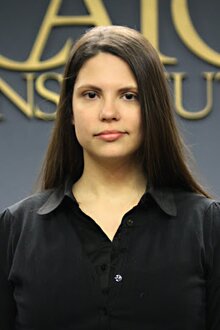PhD candidate, Harvard University
Cato Intern Class
Spring 2009
Michael Hamilton, Student Programs Coordinator, interview with Monica Magalhaes:
MH: What motivated you to intern at the Cato Institute?
MM: After I finished my undergraduate studies I was working as a journalist in Brazil, and was interested in social policy and libertarianism. I was already a reader of books and articles published by Cato, so when I heard about the internship program I immediately wanted to apply for it. At the time I was also considering going to graduate school to study public policy, so I thought getting some practical experience would be the best way to decide whether I should do that.
MH: How did your experience as a Cato intern shape your political philosophy? Did your time at the Institute change your life/views in any other meaningful ways?
MM: When I applied for the internship, I already knew Cato’s philosophy and broadly agreed with it, so I wouldn’t say it changed my political views. I learned a lot, especially about US politics and policy, policy areas I didn’t know anything about, like economic policy, and of course about many libertarian and classical liberal authors and schools of thought. I was already a libertarian when I came to Cato, but I left as a much more educated libertarian.
As for changing my life, the internship helped me to decide that I wanted to pursue a career in policy. I already had an interest in health policy, and while I was an intern at Cato the US Congress was discussing health reform, so it was a very good opportunity to read more about and discuss the subject. This interest carried over into my master’s studies, which focused on ethics in health policy, and now I’m starting a PhD program in Health Policy. So yes, my time at Cato changed my life significantly!
MH: Can you tell us a little about the work that you’re doing now?
MM: I’m starting a PhD in health policy, with a concentration in ethics. I’m interested in different systems of financing health care and of allocating resources within health systems, and their ethical implications, particularly for individual autonomy. I’d also like to study the effects that reforms that introduce more patient choice have on health systems and on access to and utilization of health services.
MH: As someone who has studied and worked around the globe, how can Cato intern alumni use their experience in Washington to help their careers while abroad?
MM: DC is a great place to make contacts that will be relevant in whatever country or region of the world the intern would like to go to — there are people from everywhere, and organizations that work with basically all countries and regions. If the intention is to continue working in market-oriented organisations abroad, Cato is a major reference that these organisations will certainly know, so having interned there helps a lot as well.
MH: If you could attend an intern seminar with any libertarian, living or dead, who would it be?
MM: Hayek. And if it’s not too much to ask, I’d like the topic of the seminar to be his ideas on disperse and imperfect knowledge and what they mean for policy decisions — not central planning of the whole economy, but the everyday policy decisions of much narrower scope that governments make all the time.
